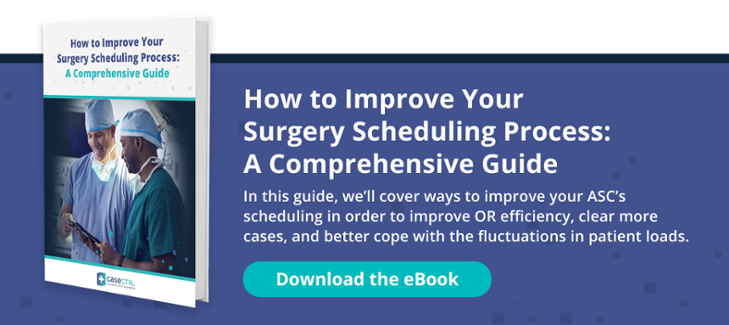While surgery cases are primarily handled by a scheduler, it really involves everyone at your ambulatory surgery center – from the practice administrator to surgeons, to the patients you serve. However, numerous barriers can prevent your ASC or your hospital from accurately and efficiently scheduling surgical cases. Many ASCs and hospitals are stuck in the past using paper-based processes, which lead to difficulties managing complex surgeon schedules and, ultimately, losing out on potential patients. For more content on strategies that improve the efficiency of ASC and practice operations, download our eBook.
While surgery scheduling software can solve many of your ASC’s or hospital's case scheduling challenges – it won’t solve all of them without some effort from your team. It takes a dedicated staff following best practices and using the best scheduling tools available to ensure that the surgery scheduling process goes smoothly. Utilizing an electronic scheduler, here are seven best surgery scheduling practices that your ASC or hospital should follow.
1. Replace Paper-Based Scheduling
How long does it take to schedule a surgery? While the answer varies, for many schedulers, it can take about an hour to schedule just one surgery – which is a valuable portion of the workday. Often, schedulers are slowed down by old paper-based scheduling. This approach is not only time consuming for the scheduler, but also prevents practice administrators and surgeons from easily accessing the information they need to manage and prepare for the whole surgery process. Moreover, schedulers cannot collaborate or share their work when scheduling information is siloed in paper posting forms.
Eliminating paper-based scheduling can reduce the amount of time surgeons spend on filling out papers – freeing them to spend more time with patients and, ultimately, relieving them from being overworked and stressed.
By switching from paper to an electronic scheduler, the time that schedulers spend can be reduced to only a few minutes, freeing up time to work on more cases, which will keep your ASC or hospital working as efficiently as possible.
2. Don’t Rely on Only One Scheduler
Life happens. A scheduler may leave for a new job, or something may come up that keeps them out of the office for a day or two – but that shouldn’t mean that your surgery center falls behind on cases. Training new schedulers may mean that they’re not up to speed for several days or weeks. However, with surgery scheduling software that is aware of individual surgeon case preferences, you can train anyone on your staff to use the system, eliminating the risk for lost time, money, or mistakes being made in the process, and the friction of familiarizing a scheduler on a surgeon’s particular preferences for surgery.
3. Maintain Open Communication with Everyone on Staff
Many surgery centers struggle with miscommunications between surgeons and schedulers. To prevent siloed processes, surgeons must be able to communicate their schedules and needs efficiently – without overwhelming schedulers.
With as many as 150 data points required for one patient’s surgery, mapping out all of the data successfully is an arduous task for even an experienced scheduler and surgeon. A surgeon must communicate complex surgical plans, timelines, and necessary resources with a scheduler. At the same time, a scheduler is juggling information such as supplies, insurance company communications, anesthesiologists, and more. It can be difficult to keep track of and manage all of this data and communications for just one surgery, let alone dozens of others. Just consider that a surgery scheduler must not only consider space constraints and staffing requirements but also track any potential conflicts and equipment needs, while ensuring that the timeline is met.
All of these processes then set the stage for an operating procedure to run smoothly. The National Center for Biotechnology Information published a study from the BMJ in 2019, stating, “An operating room (OR) can be considered a complex adaptive system (CAS), which requires that professionals act and communicate, adapt, learn, and self-organize over time. It is an interconnected and dynamic environment with an inherent potential for distractions and interruptions.” Successful surgery coordination and planning is the foundation that allows medical professionals to thrive in this complex environment.
With a proper system in place, the details aren’t lost in the process. By using an electronic surgery scheduling system, surgeons and schedulers can more easily communicate about schedules, patient data, billing, and, most importantly, ensure that the OR environment puts patient safety first.
4. Reduce Surgery Cancellations
Surgery cancellations can happen at any time for countless reasons, especially considering cancellations this past year due to COVID-19. While surgery centers should prepare if COVID-19 should cause cancellations again, it’s also vital to have an action plan when cancellations occur for other reasons too.
Cancellations can happen due to a scheduling error – you may not have the staff required for the procedure at the right time. Or perhaps you don’t have the correct supplies ready on the day of surgery because of an oversight with ordering.
Regardless of the reason, surgery scheduling software can help you to stay organized by enabling you to review surgery schedules in advance, supplies needed, and any potential conflicts for surgeons.
5. Avoid Lost Billing and Errors
Each year surgeons are losing approximately $500,000 in billing. And while surgery centers should not be solely focused on making money, this potential loss also translates to lost opportunities to help patients.
With an electronic surgery scheduling system, you can ensure that your ASC or hospital is maximizing the number of cases you’re able to schedule. As previously mentioned, you can also avoid cancellations, which can lead to lost revenue, when you have the scheduling insights you need.
You can use surgery scheduling software to ensure that cases are being properly billed to insurance companies and patients, as well as have a clear overview of complex surgical billing information, so you can more easily find potential billing errors.
6. Prioritize the Patient Experience
No two patients are the same, which means that no two procedures look the same either. An electronic surgery scheduling tool allows surgeons to effectively create customized cases for each patient, down to every detail, to ensure a successful surgery experience.
For example, many patients have additional health conditions that surgeons must be aware of before surgery. To avoid this information becoming lost, it can be provided by the patient electronically and confirmed through surgery software.
Beyond surgeons having the information they need to best help a patient, every ASC or hospital should work to communicate with patients leading up to the surgery. Implementing proactive communication is another way surgery scheduling software is valuable, as you can set up reminder calls or texts that will provide crucial information for the day of surgery.
Ultimately, it’s important to remember that most patients are a bit nervous leading up to surgery – this isn’t an everyday occurrence for them. By keeping each patient’s case well-documented and communicating with them regularly, you can set them up for the best experience possible at your ASC or hospital.
7. Utilize Data to Track, Measure, and Diagnose Potential Problems
A surgery scheduling system can offer an overview of important data points in your surgery center. By tracking and measuring this essential data, practice administrators and surgeons can proactively diagnose potential issues with surgery scheduling and then determine an action plan so that these issues won’t pop up again.
Ultimately, surgery scheduling software offers a user-friendly way to track surgical candidates. It gives practice administrators the ability to control of key processes, with insights into the data that matters the most to everyone involved – allowing you to review and take action when needed to reduce any potential challenges in your surgery scheduling process.
Improve Surgery Scheduling with Case Builder
By following these best practices, coupled with the right surgery scheduling software, you’ll find that your ASC or hospital is better equipped to handle any issues that arise.
CaseCTRL’s software was built by surgeons for surgeons to effectively manage the entire surgery scheduling process and support surgery centers so that they can improve efficiencies. CaseCTRL integrates a point of care tool called Case Builder that allows surgeons in clinic to create and communicate complex cases with ease.
Contact CaseCTRL to learn more about how our surgery scheduling software can support your ASC or hospital.







































